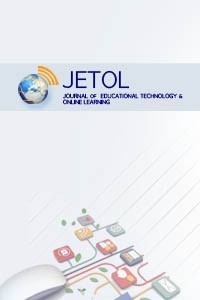Investigating learner motivation in online education in terms of self-efficacy and self-regulation
Investigating learner motivation in online education in terms of self-efficacy and self-regulation
Online Education, Motivation Self- Efficacy, Self-Regulation,
___
- Aldan Karademir, Ç., Deveci, Ö., & Çaylı, B. (2018). Ortaokul Öğrencilerinin Öz-Düzenlemeleri ve Akademik Öz-Yeterliklerinin İncelenmesi. E-Kafkas Eğitim Araştırmaları Dergisi, 5(3), 14-29.
- Arslan, A. (2018). Ortaokul Öğrencilerinin Yazma Kaygilari ve Akademik Öz-Yeterlik İnançlarinin Çeşitli Değişkenler Açısından İncelenmesi. Abant İzzet Baysal Üniversitesi Eğitim Fakültesi Dergisi, 18(3), 1286-1312.
- Avcı, Ü., Usluel, Y. K., Kurtoğlu, M. & Uslu, N. (2013). Yeniliklerin Benimsenmesi Sürecinde Rol Oynayan Değişkenlerin Betimsel Tarama Yöntemiyle İncelenmesi . Pamukkale Üniversitesi Eğitim Fakültesi Dergisi , 33 (33) , 53-71 . DOI: 10.9779/PUJE429
- Aydın, S., & Atalay, T. D. (2015). Öz-Düzenlemeli Öğrenme (2.Baskı). Ankara: Pegem Akademi Yayınları.
- Bandura, A. (1997). Self-efficacy: The exercise of control. New York: Freeman.
- Çalışkan, H. (2002). Çevrimiçi (Online) eğitimde öğrenci etkileşimi. Uluslararası Katılımlı Açık ve Uzaktan Eğitim sempozyumunda sunulan sözlü bildiri. 10 Nisan 2020 tarihinde http://aof20.anadolu.edu.tr/bildiriler/Hasan_Caliskan.doc adresinden edinilmiştir.
- Ceylan, Müyesser (2003). İki Öğretmenin Sınıf İçinde Motivasyon Değişkenlerini Dikkate Alma Davranışlarının Betimlenmesi, Anadolu Üniversitesi, Yüksek Lisans Tezi.
- Çiltaş, A. (2011). Eğitimde Öz-Düzenleme Öğretiminin Önemi Üzerine Bir Çalışma. Mehmet Akif Ersoy Üniversitesi Sosyal Bilimler Enstitüsü Dergisi, 3(5), 1-11.
- Dede, N., Keskin, A., Öztürk, E., & Keskin, M. (2021). Covid-19 Süreci ile Başlayan Uzaktan Eğitimde Ortaokul Öğrencilerinin Öz Düzenleme ve Derse Katılım İlişkisinin İncelenmesi. Dicle University Journal of Ziya Gokalp Education Faculty, (39).
- Dziuban, C., Picciano, A. G., Graham, C. R., & Moskal, P. D. (2016). Conducting research in online and blended learning environments: New pedagogical frontiers. New York: Routledge, Taylor & Francis Group.
- Eggen, P. Ve Kauchak, D. (1999). Educational Psychology, Fourth Ed. New Jersey: Printice-Hall, Inc.
- Eren, A. ve Duman, G. (2016). Güdüsel Tasarım Modeli: Öğrenme - Öğretme Süreçlerine İlişkin Yansımaları ve Diğer Yaklaşımlarla Olan İlişkileri
- Ergül, H. (2006). Çevrimiçi Eğitimde Akademik Başarıyı Etkileyen Güdülenme Yapıları. TOJET: The Turkish Online Journal of Educational Technology, 5(1).
- Hariyati, N., Wagino, W. ve Mudjito, M. (2021). Kentsel ve Kırsal Alanlarda Öğrencilerin Öğrenme Çıktıları Üzerinde Sanal Öğrenmenin İncelenmesi. Dinamika Pendidikan , 16 (1), 54-63.
- İsrael, E. (2007). Öz-düzenleme Eğitimi, Fen Başarısı ve Özyeterlilik. Yayınlanmamış Doktora Tezi, DEÜ Eğitim Bilimleri Enstitüsü: İzmir.
- Jones, C. (2020). Online Education. https://www.encyclopedia.com/finance/financeand-accounting-magazines/online-education adresinden erişilmiştir.
- Karademir, Ç. A., Deveci, Ö., & Çaylı, B. (2018). Ortaokul Öğrencilerinin Öz-Düzenlemeleri ve Akademik Öz-Yeterliklerinin İncelenmesi. e-Kafkas Journal of Educational Research, 5(3), 14-29.
- Khan, I. M. (2009). An Analysis Of The Motivational Factors In Online Learning, Yayımlanmamış Doktora Tezi, University of Phoenix.
- Klassen, R. M. & Usher, E. L. (2010). Self-efficacy in educational settings: recent research and emerging directions. ın the decade ahead: theoretical perspectives on motivation and achievement. Emerald Group Publishing Limited (pp. 1-33).
- Kuloğlu, M. E. (2020). Uzaktan eğitim öğrencilerinin akademik başarıları, başarı motivasyonları ve can sıkıntıları arasındaki ilişkinin incelenmesi. Akademik Platform Eğitim ve Değişim Dergisi, 3(1), 48-60.
- Kumar, A., Kumar, P., Palvia, S. C. J., & Verma, S. (2017). Online education worldwide: Current status and emerging trends. Journal of Information Technology Case and Application Research, 19(1), 3-9.
- Los, R. E. (2014). The effects of self-regulation and self-efficacy on academic outcome. Unpublished master’s thesis, University of South Dakota Division of Counseling and Psychology in Education: ABD.
- Ünal, N., Şanlıer, N., Şengil, A. Z. (2021). Pandemi Döneminde Üniversite Öğrencilerinin Çevrimiçi Öğrenmeye Hazırbulunuşluklarının ve Uzaktan Eğitime İlişkin Deneyimlerinin Değerlendirilmesi. İnönü Üniversitesi Sağlık Hizmetleri Meslek Yüksekokulu Dergisi, 9(1), 89-104. doi: 10.33715/inonusaglik.812109
- Üredi, İ., & Üredi, L. (2005). İlköğretim 8. sınıf öğrencilerinin öz-düzenleme stratejileri ve motivasyonel inançlarının matematik başarısını yordama gücü. Mersin Üniversitesi Eğitim Fakültesi Dergisi, 1(2).
- Orhan, Ş. (2006). Anadolu Güzel Sanatlar Liseleri Çalgı Eğitiminde Motivasyon. Dokuz Eylül Üniversitesi Buca Eğitim Fakültesi Dergisi, (20).
- Organisation for economic co-operation and development. (2013). OECD skills outlook 2013: First results from the survey of adult skills. OECD Publishing.
- Özmentes, S. (2008). Çalgı Eğitiminde Öz düzenlemeli Öğrenme Stratejileri. İnönü Üniversitesi Eğitim Dergisi. 9 (16) , 157-175
- Pintrich, PR (2000). Öz-düzenlemeli Öğrenmede Hedef Yöneliminin Rolü. İn Handbook öz düzenleme (s. 451-502). Akademik Basın.
- Sakal, M. (2017). Çevrimiçi Öğrenmede Öğrencilerin Hazirbulunuşluk Düzeylerinin Demografik Özelliklerine Göre Incelenmesi. Sosyal ve Beşeri Bilimler Araştırmaları Dergisi, 18(39), 81-102.
- Sarı, A., & Akınoğlu, O. (2009). Öz-düzenlemeli öğrenme: Modeller ve uygulamalar. M.Ü. Atatürk Eğitim Fakültesi Eğitim Bilimleri Dergisi 29, 139-154
- Senemoğlu, N. (2010). Gelişim Öğrenme ve Öğretim Kuramdan Uygulamaya (16. Baskı). Ankara: Pegem Akademi Yay. Eğt. Dan. Hiz. Tic. Ltd. Şti. Fakültesi Dergisi , 9 (16), 157-175.
- Vatensever Bayraktar, H., Sınıf Yönetiminde Öğrenci Motivasyonu ve Motivasyonu Etkileyen Etmenler, Turkish Studies - International Periodical for the Languages, Literature and History of Turkish or Turkic Volume 10/3 Winter 2015, p. 1069-1090, ISSN: 1308-2140, www.turkishstudies.net, DOI Number: http://dx.doi.org/10.7827/TurkishStudies.7788, ANKARA-TURKEY
- Viau, R. (2015). Okulda motivasyon okulda güdülenme ve güdülenmeyi öğrenme (1.Baskı) Çeviren Yusuf Budak. Ankara: Anı yayıncılık.
- Yüksel, G. (2003). İlköğretim Öğrencilerinin Gelişim Alanları, Gelişim Alanlarının İşaretçisi Olan İhtiyaçlar ve Geliştirilmesi Gereken Beceriler; Bu Süreçte Rehber Öğretmenin İşlevleri: Kurumsal Bir İnceleme. Milli Eğitim Dergisi, 159 (3).
- Zimmerman, B. J. & Bandura, A. (1994). Impact of self-regulatory influences on writing course attainment. American Educational Research Journal, 31(4), 845-862.
- ISSN: 2618-6586
- Yayın Aralığı: Yılda 3 Sayı
- Başlangıç: 2017
- Yayıncı: Gürhan DURAK
The relationship between teacher candidates' fear of missing out levels and behavior on social media
Can MIHCI, Deniz Mertkan GEZGİN
A systematic review of educational suggestions on generation Z in the context of distance education
Murat TOPAL, Aslihan İSTANBULLU, Sirin KUCUK-AVCI
Action research as a tool of teaching ESP in a flipped learning environment
Ozan Deniz KIYICI, Filiz DİKKARTIN ÖVEZ
Mehmet SARIOĞLAN, Cevdet AVCIKURT, Bilal DEVECİ
Şeyma ATAHAN, Sevinç MERT UYANGÖR
Teaching writing skills in EFL classes with blending learning
